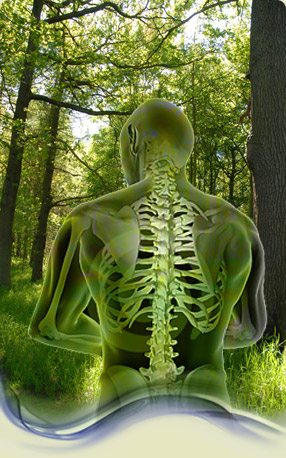 |  |
 |
 |
 |
| |||||
|
Bodywork Menu |
What Is Fibromyalgia
Syndrome? Fibromyalgia Syndrome is a widespread musculoskeletal pain and fatigue disorder for which the cause is still unknown. Fibromyalgia means pain in the muscles, ligaments, and tendons - the soft fibrous tissues in the body. Most patients with FMS say that they ache all over. Their muscles may feel like they have been pulled or overworked. Sometimes the muscles twitch and at other times they burn. More women than men are afflicted, and it shows up in people of all ages. To help your family and friends relate to your condition, have them think back to the last time they had a bad flu. Every muscle in their body shouted out in pain. In addition, they felt devoid of energy as though someone had unplugged their power supply. While the severity of symptoms fluctuate from person to person, FMS may resemble a post-viral state. This similarity is the reason experts in the field of FMS and chronic fatigue syndrome (CFS) believe that these two syndromes may be one and the same. Gulf War Syndrome also overlaps with FMS/CFS. |
||||
| How is Fibromyalgia Syndrome
Diagnosed? For the most part, routine laboratory testing reveals nothing. However, upon physical examination, patients will be sensitive to pressure in certain areas of the body, called tender points. To meet the diagnostic criteria, patients must have widespread pain in all four quadrants of their body for a minimum duration of three months and possess at least 11 of the 18 specified tender points. These 18 sites used for diagnosis cluster around the neck, shoulder, chest, hip, knee, and elbow regions. Roughly 75% of the CFS-diagnosed patients will meet the FMS criteria. While many chronic pain syndromes display some symptoms that overlap with FMS, the 1990 multi-center criteria (published in the Feb. 1990 issue of Arthritis and Rheumatism) evaluated a total of 558 patients, of which 265 were classified as controls. These control individuals were not your typical healthy "normals". They were age- and sex-matched patients with neck pain syndrome, low back pain, local tendinitis, trauma-related pain syndromes, rheumatoid arthritis, lupus, osteoarthritis of the knee or hand, and other painful disorders. These patients all had some symptoms that mimic Fibromyalgia, but the trained examiners were not foiled - they hand-picked the FMS patients out of the "chronically ill" melting pot with an accuracy of 88%. FMS is not a wastebasket diagnosis! What if you have widespread pain, but you only have seven or eight of the diagnostic tender points? A 1996 consensus report by 35 researchers says that you still may be diagnosed with Fibromyalgia as long as you also battle may of the associated symptoms described below. |
|||||
| Symptoms
and Associated Syndromes
Pain - The pain of Fibromyalgia has no boundaries. People describe the pain as deep muscular aching, throbbing, shooting, and stabbing. Intense burning may also be present. Quite often, the pain and stiffness are worse in the morning and you may hurt more in muscle groups that are used repetitively. Fatigue - This symptom can be mild in some patients and yet incapacitating in others. The fatigue has been described as "brain fog" in which patients feel totally drained of energy. Many patients depict this situation by saying that they feel as though their arms and legs are tied to concrete blocks, and they have difficulty concentrating. Sleep
Disorder -
Most Fibromyalgia patients have an associated sleep
disorder called the alpha-EEG anomaly. This condition was
uncovered in a sleep lab with the aid of a machine which
recorder the brain waves of patients during sleep.
Researchers found that most FMS patients could fall
asleep without much trouble, but their deep level (or
stage 4) sleep was constantly interrupted by bursts of
awake-like brain activity. Patients appeared to spend the
night with foot in sleep and the other one out of it. Irritable Bowel Syndrome - Constipation, diarrhea, frequent abdominal pain, abdominal gas, and nausea represent symptoms frequently found in roughly 40 to 70% of Fibromyalgia patients. Chronic Headaches - Recurrent migraine or tension-type headaches are seen in about 50% of Fibromyalgia patients and can pose a major problem in coping for this patient group. Temporomandibular Joint Dysfunction Syndrome (TMJ) - This syndrome causes tremendous jaw-related face and head pain in one quarter of Fibromyalgia patients. However, a 1997 published report indicated that close to 75% of Fibromyalgia patients have a varying degree of jaw discomfort. Typically, the problems are related to the muscles and ligaments surrounding the jaw joint and not necessarily the joint itself. Other Common Symptoms - Premenstrual syndrome and painful menstruation, chest pain, morning stiffness, cognitive or memory impairment, numbness and tingling sensations, muscle twitching, irritable bladder, the feeling of swollen extremities, skin sensitivities, dry eyes and mouth, dizziness, and impaired coordination can occur. Patients are often sensitive to odours, loud noises, bright lights, and sometimes even the medications that they are prescribed. Aggravating Factors - Changes Treatment - Gentle massage techniques, CranioSacral Therapy |
|||||
| Have a Look at Our Therapist's Resume | Contact Us | ||||
| Northland, Kerikeri, Massage, Maternity Massage, Pregnancy Massage, Kerikeri, Back Pain, Neck Pain, Kerikeri | |||||